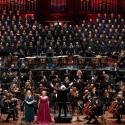"What is it about Mozart?" asked Sviatoslav Richter in 1982. "Is there a pianist alive who really manages to play him well?...Haydn is infinitely less difficult to play (he's almost easy, in fact). So what is Mozart's secret?" Just over a decade later, he went a long way towards unlocking that secret in a Moscow recital, playing three sonatas and the C minor Fantasia in Grieg's two-piano adaptations with Elisabeth Leonskaja, the younger colleague whose playing he so inspired. And I'm sure that if he were alive today, he would have given the ultimate accolade to his one-time protégée's recital last night. This was kaleidoscopic Mozart with a lifetime's wisdom and experience behind it; that not all the notes were there in the early stages affected the expressive intent not a jot.
It may look as if theartsdesk covers too many of Leonskaja's concerts, including three Wigmore Hall appearances over the last four months alone. But this is because she has seemingly infinite amounts to teach us about the composers on whom she focuses; Chopin, in a huge programme back in 2009 with the second and third sonatas alongside significant single-movement works, played without applause in between: Schubert, of whose sonatas she is surely the supreme living exponent; Beethoven, including the last three sonatas in a single late-night concert last September; and now Mozart plus. The "plus" in this case was totally enriching: betwen the F major Sonata, K280 and the B flat treasure, K570, Schoenberg's Three Pieces, Op. 11, with which incidentally the 20-year-old composer-pianist Sergey Prokofiev introduced the Austrian's music to Russia in 1911.
 The initial flourish here gave us an uncanny link to the flow of the preceding Mozart finale, after which all perceptible form is abandoned in favour of a free flow where Leonskaja's shaping of phrases, dynamic range and an orchestral sense of colour kept us riveted. This is Schoenberg's very individual answer to the three-movement sonatas of the first Viennese school. The creepy oscillating thirds in the central piece keep returning, with what could be repeat marks; the furious finale, composed six months after the other two, crashes out of any references to the past. Length-wise, the pieces are as long as now seems reasonable to hang about in an atonal haunted house, and context was all. Within the Mozart sonatas, Leonskaja's meticulously observed expression gave us maximum conflict between melancholy minor – in the main body of the programme, only the central movement of K280 and the Valse triste of the A minor Rondo begin that way – and a dance into major-key light (the earlier of the two F major sonatas' final Presto, following its Adagio with only a moment's break, proved tearfully joyous, the chordal simplicity of its countpart in the B flat Sonata K570 all the more welcome after its first, minor-key episode). Breathtaking sleight-of-hand switches between mood and register were launched with the second subject of K280 – left-hand unisons followed by nimble right-hand runs, but that doesn't begin to convey the magic Leonskaja conveyed here.
The initial flourish here gave us an uncanny link to the flow of the preceding Mozart finale, after which all perceptible form is abandoned in favour of a free flow where Leonskaja's shaping of phrases, dynamic range and an orchestral sense of colour kept us riveted. This is Schoenberg's very individual answer to the three-movement sonatas of the first Viennese school. The creepy oscillating thirds in the central piece keep returning, with what could be repeat marks; the furious finale, composed six months after the other two, crashes out of any references to the past. Length-wise, the pieces are as long as now seems reasonable to hang about in an atonal haunted house, and context was all. Within the Mozart sonatas, Leonskaja's meticulously observed expression gave us maximum conflict between melancholy minor – in the main body of the programme, only the central movement of K280 and the Valse triste of the A minor Rondo begin that way – and a dance into major-key light (the earlier of the two F major sonatas' final Presto, following its Adagio with only a moment's break, proved tearfully joyous, the chordal simplicity of its countpart in the B flat Sonata K570 all the more welcome after its first, minor-key episode). Breathtaking sleight-of-hand switches between mood and register were launched with the second subject of K280 – left-hand unisons followed by nimble right-hand runs, but that doesn't begin to convey the magic Leonskaja conveyed here.
Mozart's later tweaks to a convention – the startling suspensions in K533/494 and K570 - were all the more surpising for flowing within the whole and in the Rondo of the second F major Sonata, Leonskaja's peerless sense of always energised space gave us a blissful walking-tune which seemed to point the way forward to Schubert's most delightful finale, the one in his "Gasteiner" Sonata. Nothing could have crowned the evening more profoundly than the encore – this time a pointer forward to Beethoven in its sombre, Prospero-like opening, but ending in true Mozartian ineffable lightness of being, the D minor Fantasia. Again, you were left in awe – but first and foremost of Mozart's genius. A far from full house gave the lie to the received wisdom that the Wigmore's patrons are the finest connoisseurs of great musicianship, but the intense silences from a devoted crowd only allowed the inner light of this remarkable interpreter to be perceived more clearly.














Add comment